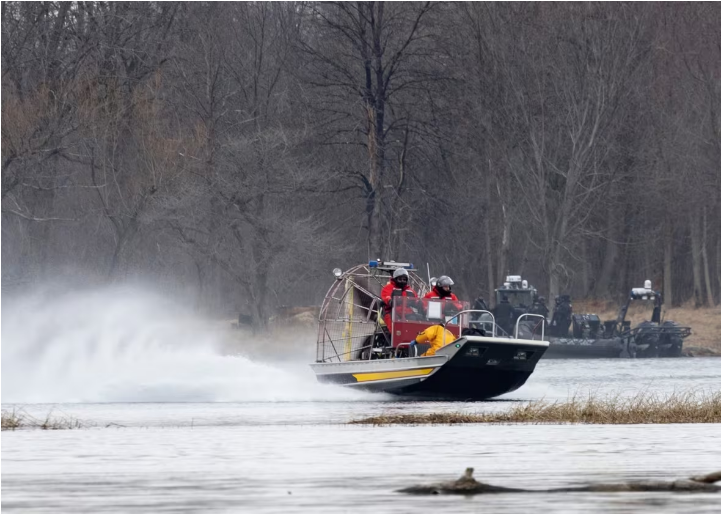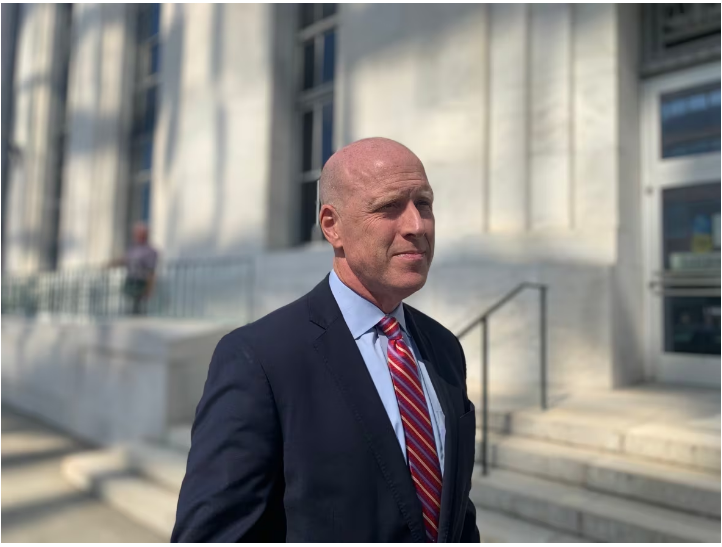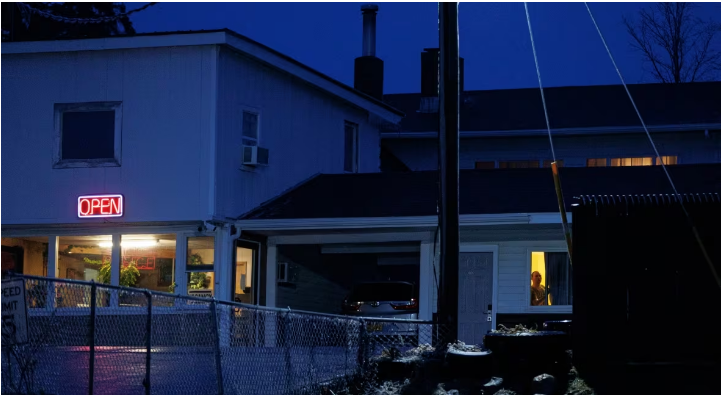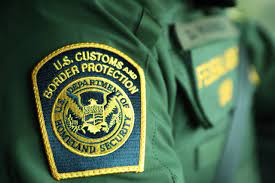Best CCTV Security Camera in Brampton

Simranjit Singh, a 41-year-old man from Brampton, Ont., pleaded guilty to nine counts of human smuggling before the U.S. Federal Court for the Northern District of New York on Friday. The case has revealed more information on a network that potentially moved hundreds of people from India across the Canada-U.S. border.
Best CCTV Camera in Brampton
An Indian national from Brampton, Ont., pleaded guilty in a U.S. federal court on Friday to human smuggling as part of a network that potentially moved hundreds of people from India across the Canada-U.S. border.
Simranjit (Shally) Singh, 41, pleaded guilty to six counts of alien smuggling and three counts of conspiracy to commit alien smuggling during an appearance in Albany, N.Y., before Judge Mae A. D’Agostino.
Singh appeared in a short-sleeved orange jumpsuit with “ACCF Inmate” written on the back, which stands for Albany County Correctional Facility. He wore black-rimmed glasses, with salt and pepper stubble spread down his cheeks and chin. There was a small tattoo behind his left ear and another scrawled down his left forearm.
None of Singh’s family or friends appeared at the hearing.
Singh’s plea agreement included an admission that he arranged to smuggle people into the U.S. from India by flying them to Calgary, Toronto and Montreal, before transporting them to Cornwall, Ont. Singh then moved the Indian nationals by boat across the St. Lawrence River through Akwesasne, a Haudenosaunee community that straddles the Canada-U.S. border and sits about 120 kilometres west of Montreal.
U.S. authorities said Singh bragged he smuggled more than 1,000 people into the U.S. from Canada.
The case against Singh was based on evidence gathered through surveillance, Facebook messages and human sources related to four failed smuggling attempts across the St. Lawrence River between March 2020 and April 2022, according to court records.
Singh acted as a broker, charging $5,000 to $35,000 per person to smuggle mainly Indian nationals into the U.S. He then paid people in Akwesasne between $2,000 to $3,000 per person to take them across the river through the community’s territory.
Cheap CCTV Camera in Brampton

Crews search for bodies on the St. Lawrence River in Akwesasne on March 31, 2023, following a fatal smuggling attempt that left eight people dead. (Christinne Muschi/Reuters)
Home CCTV Camera in Brampton
Singh’s indictment is not connected to the deaths of eight suspected migrants — including four Indian citizens — on the St. Lawrence in March.
However, there are similarities in Singh’s routes and tactics, and those used by the network behind the fatal human smuggling attempt, which also left a Romanian family of four dead.
The plea agreement included the admission that Singh, using locals, loaded Indian nationals on boats which launched from Cornwall Island in Akwesasne, across the water to the southern shore of the St. Lawrence River, where they were picked up in vehicles and taken to nearby New York state motels.
This was the same route followed by the Indian and Romanian families who died in March.
After the hearing, Singh’s lawyer, Lee Kindlon, told CBC News that his client was likely exaggerating when he claimed he smuggled 1,000 people over the border. Kindlon said Singh was just a cog in a much bigger network.
“Hopefully through sentencing, we can show that his role in this larger enterprise was actually quite small,” said Kindlon, with the Albany-based Kindlon Law Firm.
“I’m not sure how much he entirely knows about the larger network. Everyone answers to somebody else, but who is on top of the food chain, I am not sure he knew or understood.”
Best CCTV Camera in Brampton

Defence lawyer Lee Kindlon says his client, Simranjit Singh, was just a cog in a much larger network. (Jorge Barrera/CBC)
Cheap CCTV Camera in Brampton
Singh was also suffering from depression and anxiety in jail, Kindlon said.
Singh’s sentencing hearing is scheduled for Dec. 28, 2023. He faces a potential prison sentence ranging from five to 15 years and deportation to India.
“He has always been regretful about getting carried away in this whole thing,” said Kindlon. “Saying guilty here is the first step toward redemption and ultimately acceptance of punishment and responsibility.”
Evidence gathered by U.S. authorities shows Singh exploited vulnerable Akwesasne members facing addiction and poverty as part of his operation.
Singh, who was facing deportation from Canada when he was arrested and extradited, originally arrived in Montreal from India in 2010 with his then-wife and one child, and filed refugee claims. His mother then arrived with his other child and also filed refugee claims. All five were ultimately rejected, according to court records.
Canadian authorities could not return them to India because the Indian Consulate refused to provide travel documents.
Singh attempted to stay in Canada after marrying a second wife, who sponsored him. That application was pending at the time of his arrest in the summer of 2022.
The U.S. case against Singh grew from his failed attempt to smuggle three Indian nationals into the U.S. in March 2020, shortly before the COVID-19 pandemic triggered a shutdown of the border.
In this instance, he used a single mother of two from Akwesasne dealing with severe trauma and facing care-related costs for one of her children, who required extensive hospitalization, according to court records.
The woman is said to have picked up three Indian nationals after they crossed the St. Lawrence River, driving them to a motel over the eastern border of Akwesasne, which was under watch by U.S. Border Patrol.
Agents stopped her vehicle the next day, after she returned and picked up the three Indian nationals, who tried running from the traffic stop. The woman also tried to flee, eventually crashing into four Border Patrol vehicles.
In another case in late winter 2021, a family in India allegedly paid Singh thousands of dollars to smuggle a family member into the U.S. Singh drove the individual to a motel in Cornwall, Ont.
“Singh bragged about smuggling over 1,000 people and that [the Indian national] had nothing to worry about,” according to U.S. records.
The Indian national boarded a boat on March 4 with three other migrants, and landed on a U.S. portion of Akwesasne governed by the St. Regis Mohawk Tribal Council. But no one was there to pick them up.
The tribal police found three of them and called U.S. Border Patrol. The fourth was found at a motel in Massena, N.Y.
An Ontario man who once allegedly bragged he’d moved over 1,000 people across the Canada-U.S. border, is now facing a nine-count indictment alleging he was the “primary organizer” of a human smuggling network using Akwesasne Mohawk territory.
Simranjit “Shally” Singh of Brampton, Ont., pleaded not guilty on Wednesday in the U.S. Federal Court for the Northern District of New York to charges related to human smuggling. He was extradited to the U.S. on Thursday.
The indictment is based on evidence gathered through surveillance, Facebook messages and human sources related to four failed smuggling attempts across the St. Lawrence River between March 2020 and April 2022, according to court records.
Singh allegedly acted as a broker, charging $5,000 to $35,000 per person to smuggle mainly Indian nationals into the U.S., according to court records.
He then paid people in the community between $2,000 to $3,000 per person to take them across the river through Akwesasne territory.
Singh’s indictment is not connected to the deaths of eight suspected migrants — including four Indian citizens — on the St. Lawrence last week.
However, there are similarities.
Singh, on one occasion, allegedly offered a woman $4,000 to take three Indian nationals across the river to a nearby motel in New York state, according to court records.
Court records also allege that, at least once, Singh shared the same Akwesasne boatman with another smuggling broker, indicating more than one of them was operating through the Kanien’kehá:ka (Mohawk) territory which straddles the Ontario, Quebec and New York state borders. The St. Lawrence River runs through the community, creating channels around islands.
Singh, who is currently facing deportation in Canada, arrived in Montreal from India in 2010 with his then-wife and one child and filed refugee claims. His mother then arrived with his other child and also filed refugee claims. All five were ultimately rejected, according to court records.
Canadian authorities could not return them to India because the Indian consulate refused to provide travel documents. Singh is now attempting to stay through his second wife, who sponsored him. That application was pending at the time of his arrest last summer.
On a Tuesday evening in March 2020, days before the COVID-19 pandemic closed the border, Singh allegedly arranged to smuggle three Indian nationals across the river.
He communicated over Facebook messenger with the aforementioned woman, a single mother, from Akwesasne to pick them up once they reached the shore.
“Ok they cross river,” Singh wrote, at 8:51 p.m. on March 17, 2020, according to evidence from U.S. authorities filed in a Canadian court as part of his extradition.
“Yes,” replied the woman, who then drove them about 15 kilometres to the Great View Motel in Fort Covington, N.Y.
The woman, who CBC News is not naming, told the court she was struggling with addictions at the time to bury severe trauma caused by years of child sexual abuse and later violent domestic abuse.
One of her two children also suffered serious medical ailments requiring extensive hospitalization, according to court records.
She took the migrants to Room 103 shortly before 9 p.m. and texted Singh.
“Dropped,” she wrote.
Home CCTV Camera in Brampton

Three Indian nationals stayed briefly at the Great View Motel, seen here on Wednesday, after they were smuggled into the U.S. in March 2020, allegedly under Singh’s direction. (Evan Mitsui/CBC)
Best CCTV Camera in Brampton
She then drove to Cornwall, Ont. — on the northern shore of the St. Lawrence — to collect her pay and deliver bottles of liquor to Singh.
By the next morning, U.S. Border Patrol agents waited and watched at the hotel. They knew she had delivered migrants there, according to court records. She had also used her own name to book their room and, worried, returned to pick them up — allegedly against Singh’s advice.
Agents followed her before pulling them over. Three men “were seen ‘bailing out'” of the car, according to the documents. They were detained and charged with improper entry by an alien. After pleading guilty they were processed through the immigration system.
But the woman allegedly sped off and crashed into four Border Patrol vehicles. She was taken to hospital as a precautionary measure and charged. She eventually pleaded guilty to one count of conspiracy to commit alien smuggling and was sentenced to time served last year.
In one of the other cases, in late winter 2021, a family in India allegedly paid Singh thousands of dollars to smuggle a family member into the U.S. Singh drove the individual to a motel in Cornwall.
“Singh bragged about smuggling over one thousand people and that [the Indian national] had nothing to worry about,” according to U.S. records.
The Indian national boarded a boat on March 4, with three other migrants. They landed on a U.S. portion of Akwesasne governed by the St. Regis Mohawk Tribal Council.
But there was no one there to pick them up. The tribal police found three of them and called U.S. Border Border Patrol. The fourth was found at a motel in Massena, N.Y.
One of the migrants said he paid $5,000 and wanted to go to live with a relative in San Francisco, according to records of their arrest. Another told U.S. Border Patrol agents he paid $15,000 and he wanted to work in New York City.
A third said he paid $7,000 US, but had no destination in mind.
They all pleaded guilty to illegally entering into the U.S., were sentenced to time served and processed through the U.S. immigration system.
Cheap CCTV Camera in Brampton
Home CCTV Camera in Brampton
An Akwesasne woman was charged last week for allegedly smuggling three foreign nationals into the U.S., triggering concerns that the persistent trickle of illegal border crossers in the area is putting the Mohawk community at risk during the COVID-19 pandemic.
On March 18, a community member was detained after crashing into four U.S. Border Patrol vehicles and charged with smuggling two nationals from India and one from Italy into the U.S. from Canada.
“Obviously we are concerned about any people coming through our community that aren’t from our territory that may have been exposed to or be carriers of the virus,” said Akwesasne Grand Chief Abram Benedict, whose government oversees the Canadian side of the community.
“It’s unfortunate that organized crime continues.”
Akwesasne is about 120 kilometres west of Montreal and straddles the Canadian and New York State border.
Akwesasne declared a state of emergency on March 16 over COVID-19 and is currently requesting any community members who travel more than 80 km away to self isolate for 14 days when they return home. Akwesasne has one case of COVID-19 from the U.S. side.
The three foreign nationals were allegedly smuggled into Akwesasne by boat across the St. Lawrence River and then driven to the Great View Motel, about seven kilometres outside the reserve’s Canadian boundary, according to court records and the office of the Assistant U.S. Attorney for the district of northern New York.
At 8:50 a.m. on March 18, agents watched the Akwesasne woman enter the hotel parking lot in her car and allegedly leave shortly after with three men in the back seat. She headed toward Fort Covington, N.Y., about two kilometres east of the motel, according to court documents.
U.S. Border Patrol agents stopped her vehicle and the three men “were seen ‘bailing out'” of the car, according to the documents. All three men were detained and charged with improper entry by an alien and are currently in custody, according to court records.
The woman then allegedly sped off in her car and crashed into four Border Patrol vehicles before she was stopped, detained and taken to hospital as a precautionary measure.
Benedict said the financial impact of the COVID-19 pandemic, which has forced the shut down of large swaths of the service industry on both sides of the border, is concerning.
“I think the agencies need to continue to do their part, especially since lots of people are unemployed and people will turn to turn to desperate actions to provide for themselves,” said Benedict.
“This may not be the first case.”
Foreign nationals attempting to cross into the U.S. pay thousands of dollars to get smuggled through, court records show.
In one case, from Feb. 28, a tip from Canadian authorities led to the apprehension of four Mexican nationals who had crossed the border on foot into an area near Champlain, N.Y., south of Montreal. The detained men told U.S. authorities they were paying $6,000 US to be taken to North Dakota.
While publicly available U.S. Border Patrol statistics don’t show numbers by sectors, data shows that in 2019 about 1,500 people were caught illegally crossing into the U.S. along the Ontario-Quebec-New York State-Vermont-New Hampshire border.
New York State is one of the U.S. states with highest rates of COVID-19. The state had 92,381 cases as of Thursday, with the majority (52,000) in New York City.
Ontario had 2,793 confirmed COVID-19 cases as of Thursday.
A total of eight foreign nationals, including the three from India and Italy, have been caught crossing into New York State from Canada within 14 kilometres of Akwesasne since March 14.
Five Mexican nationals were caught on March 16 by U.S. border authorities crossing the border in an area about 12 km east of Akwesasne, near Fort Covington. At least one of them had been detained “numerous times” by agents in Texas and was deported in April 2018 through the Laredo, Tex., port of entry, according to court documents.
A spokesperson for U.S. Customs and Border Patrol said in an emailed statement that the agency determines whether to keep detained individuals in the U.S. or send them back to Canada “on a case by case basis, depending on the status of the individual in the U.S.”
The Canada Border Services Agency said it was up to U.S. authorities to disclose whether any individual detained crossing illegally was sent back to Canada.
Benedict said he has asked whether illegal border crossers could be intercepted before they cross into the U.S.
“These immigrants aren’t born and raised in our community… they are obviously coming from somewhere and it likely goes right by lots of enforcement agencies,” said Benedict.
“It is extremely concerning to us because our police services need to be keeping our communities safe, especially at this time, and then to have it be compounded by trafficking of people.”

